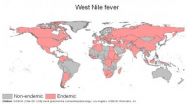(Press-News.org) KNOXVILLE, TN – Since the mid-nineteenth century, maps have helped elucidate the deadly mysteries of diseases like cholera and yellow fever. Yet today's global mapping of infectious diseases is considerably unreliable and may do little to inform the control of potential outbreaks, according to a new systematic mapping review of all clinically important infectious diseases known to humans.
Of the 355 infectious diseases assessed in the review, 174 showed a strong rationale for mapping and less than 5 percent of those have been mapped reliably. Unreliable mapping makes it difficult to fully understand the geographic scope and threat of disease and therefore make informed policy recommendations for managing it, write the authors of the study, which appears as open access on Feb. 4 in the journal Philosophical Transactions of the Royal Society B.
An online, open-access database, which accompanies the study, provides a quantitative scheme for evaluating the quality of data available for each infectious disease as well as specific mapping recommendations for each disease. Among the recommendations for improving disease cartography are the use of new crowdsourcing techniques to gather data, such as analyzing the content and frequency of Twitter messages about disease. Twitter feeds during the 2009 H1N1 flu outbreak, for example, predicted outbreaks sooner than traditional disease surveillance methods.
"We have shown that novel solutions exist to enable us to use up-to-date data and technology to rapidly improve our geographic knowledge of a wide range of clinically important pathogens," said Katherine Battle, one of the study's co-authors from the University of Oxford.
Unique to the review is the inclusion of how the basic reproduction rate, which is the primary epidemiological number used to determine the degree which a disease can spread through a population, might vary among pathogens.
"There is a clear need for better estimates of the potential growth of infectious diseases that allow spatial variations to be taken into consideration, and this paper is a wonderful contribution to help us meet this need," said Louis Gross, the director of the National Institute for Mathematical and Biological Synthesis, which sponsored a workshop in 2011 that produced the paper.
INFORMATION:
Citation: Hay SI et al. 2012. Global mapping of infectious disease. Philosophical Transactions of the Royal Society B. Published online 4 February 2013.
The National Institute for Mathematical and Biological Synthesis (NIMBioS) brings together researchers from around the world to collaborate across disciplinary boundaries to investigate solutions to basic and applied problems in the life sciences. NIMBioS is sponsored by the National Science Foundation, the U.S. Department of Homeland Security, and the U.S. Department of Agriculture with additional support from The University of Tennessee, Knoxville.
Contact Information:
Catherine Crawley, NIMBioS
Katherine Battle, University of Oxford
katherine.battle@zoo.ox.ac.uk
44-1865-281210
Avoiding a cartography catastrophe
Study recommends new tools to improve global mapping of infectious disease
2013-02-04
ELSE PRESS RELEASES FROM THIS DATE:
AB blood type strong risk factor for venous blood clots
2013-02-04
The non-O ABO blood type is the most important risk factor for venous thromboembolism (blood clots in veins), making up 20% of attributable risk for the condition, according to a new study in CMAJ (Canadian Medical Association Journal).
This finding has implications for genetic screening for thrombophilia, a genetic predisposition to abnormal blood clotting.
Danish researchers looked at data on 66 001 people who had been followed for 33 years from 1977 through 2010 to determine whether ABO blood type is associated with an increased risk of venous blood clots in the ...
Tuberculosis in Nunavut can be controlled
2013-02-04
A combined strategy is needed to combat tuberculosis in Nunavut where the rate is 66 times higher than in the general Canadian population, states a commentary in CMAJ (Canadian Medical Association Journal).
Nunavut, Canada's eastern territory in the north, has seen a dramatic increase in the disease since 1997. Previous efforts to eradicate the disease focused on early identification and treatment of people as well as treatment of latent cases. This intense approach helped decrease the number of cases, but was not continued.
"Intensive control activities should be expanded ...
Physicians' roles on the front line of climate change
2013-02-04
Physicians can and should help mitigate the negative health effects of climate change because they will be at the forefront of responding to the effects of global warming, argues an editorial in CMAJ (Canadian Medical Association Journal).
Doctors could use their political influence to lobby government on climate issues that are already affecting health and to become signatories to the Doha Declaration on Climate, Health and Wellbeing.
They can also act at a professional level, by leading health institutions to cut back on greenhouse gases and reduce clinical waste.
"The ...
JoVE expands scientific video publication into chemistry
2013-02-04
February 4, 2013
Cambridge, MA: On Monday, February 4, 2013, JoVE (Journal of Visualized Experiments) will launch the first scholarly scientific video publication for chemistry. Following its successful introduction of video publications for the biological and physical sciences, JoVE received numerous requests for a chemistry counterpart. In response, the journal is launching a new section, JoVE Chemistry, dedicated to visualized publication of experiments across different areas of chemistry research including organic chemistry, chemical biology, electrochemistry, and ...
Pitt researchers reveal mechanism to halt cancer cell growth, discover potential therapy
2013-02-04
PITTSBURGH, Feb. 4, 2013 – University of Pittsburgh Cancer Institute (UPCI) researchers have uncovered a technique to halt the growth of cancer cells, a discovery that led them to a potential new anti-cancer therapy.
When deprived of a key protein, some cancer cells are unable to properly divide, a finding described in the cover story of the February issue of the Journal of Cell Science. This research is supported in part by a grant from the National Institutes of Health.
"This is the first time anyone has explained how altering this protein at a key stage in cell ...
Men are from Mars Earth, women are from Venus Earth
2013-02-04
For decades, popular writers have entertained readers with the premise that men and women are so psychologically dissimilar they could hail from entirely different planets. But a new study shows that it's time for the Mars/Venus theories about the sexes to come back to Earth.
From empathy and sexuality to science inclination and extroversion, statistical analysis of 122 different characteristics involving 13,301 individuals shows that men and women, by and large, do not fall into different groups. In other words, no matter how strange and inscrutable your partner may ...
Low rainfall and extreme temperatures double risk of baby elephant deaths
2013-02-04
Extremes of temperature and rainfall are affecting the survival of elephants working in timber camps in Myanmar and can double the risk of death in calves aged up to five, new research from the University of Sheffield has found.
With climate change models predicting higher temperatures and months without rainfall; this could decrease the populations of already endangered Asian elephants.
The researchers matched monthly climate records with data on birth and deaths, to track how climate variation affects the chances of elephant survival.
It is hoped this research ...
Your history may define your future: Tell your doctor
2013-02-04
Boston, MA—Your family history is important, not just because it shaped you into who you are today, but it also impacts your risk for developing cancer and other chronic diseases. For example, if one of your family members had cancer, your primary care doctor needs to know. Being able to identify individuals at increased risk can help reduce mortality. In a study published this week in the online version of the Journal of General Internal Medicine, researchers at Brigham and Women's Hospital (BWH) found that patients who use a web-based risk appraisal tool are more likely ...
Tropical rainfall patterns varied through time
2013-02-04
PITTSBURGH—Historic lake sediment dug up by University of Pittsburgh researchers reveals that oceanic influences on rainfall in Central America have varied over the last 2,000 years, highlighting the fluctuating influence the Atlantic and Pacific Oceans have on precipitation.
The Pitt study, published in the February print edition of the peer-reviewed journal Geology, shows that factors currently producing drier climates in Central America actually resulted in wetter conditions a few hundred years ago, providing a deeper understanding of drought cycles in that region ...
Study finds health departments hindered in addressing health concerns from animal production sites
2013-02-04
State and local health departments face significant barriers and usually do not get involved when confronted with public health concerns resulting from food animal production sites, according to a new study led by researchers at the Johns Hopkins Center for a Livable Future at the Bloomberg School of Public Health.
The authors of the study, published in PLOS ONE, an open-access publisher of scientific research, examined the role of local and state health departments in responding to and preventing community-driven concerns associated with animal production sites. This ...
LAST 30 PRESS RELEASES:
Next-generation CAR-T designs that could transform cancer treatment
As health care goes digital, patients are being left behind
A clinicopathologic analysis of 740 endometrial polyps: risk of premalignant changes and malignancy
Gibson Oncology, NIH to begin Phase 2 trials of LMP744 for treatment of first-time recurrent glioblastoma
Researchers develop a high-efficiency photocatalyst using iron instead of rare metals
Study finds no evidence of persistent tick-borne infection in people who link chronic illness to ticks
New system tracks blockchain money laundering faster and more accurately
In vitro antibacterial activity of crude extracts from Tithonia diversifolia (asteraceae) and Solanum torvum (solanaceae) against selected shigella species
Qiliang (Andy) Ding, PhD, named recipient of the 2026 ACMG Foundation Rising Scholar Trainee Award
Heat-free gas sensing: LED-driven electronic nose technology enhances multi-gas detection
Women more likely to choose wine from female winemakers
E-waste chemicals are appearing in dolphins and porpoises
Researchers warn: opioids aren’t effective for many acute pain conditions
Largest image of its kind shows hidden chemistry at the heart of the Milky Way
JBNU researchers review advances in pyrochlore oxide-based dielectric energy storage technology
Novel cellular phenomenon reveals how immune cells extract nuclear DNA from dying cells
Printable enzyme ink powers next-generation wearable biosensors
6 in 10 US women projected to have at least one type of cardiovascular disease by 2050
People’s gut bacteria worse in areas with higher social deprivation
Unique analysis shows air-con heat relief significantly worsens climate change
Keto diet may restore exercise benefits in people with high blood sugar
Manchester researchers challenge misleading language around plastic waste solutions
Vessel traffic alters behavior, stress and population trends of marine megafauna
Your car’s tire sensors could be used to track you
Research confirms that ocean warming causes an annual decline in fish biomass of up to 19.8%
Local water supply crucial to success of hydrogen initiative in Europe
New blood test score detects hidden alcohol-related liver disease
High risk of readmission and death among heart failure patients
Code for Earth launches 2026 climate and weather data challenges
Three women named Britain’s Brightest Young Scientists, each winning ‘unrestricted’ £100,000 Blavatnik Awards prize
[Press-News.org] Avoiding a cartography catastropheStudy recommends new tools to improve global mapping of infectious disease



